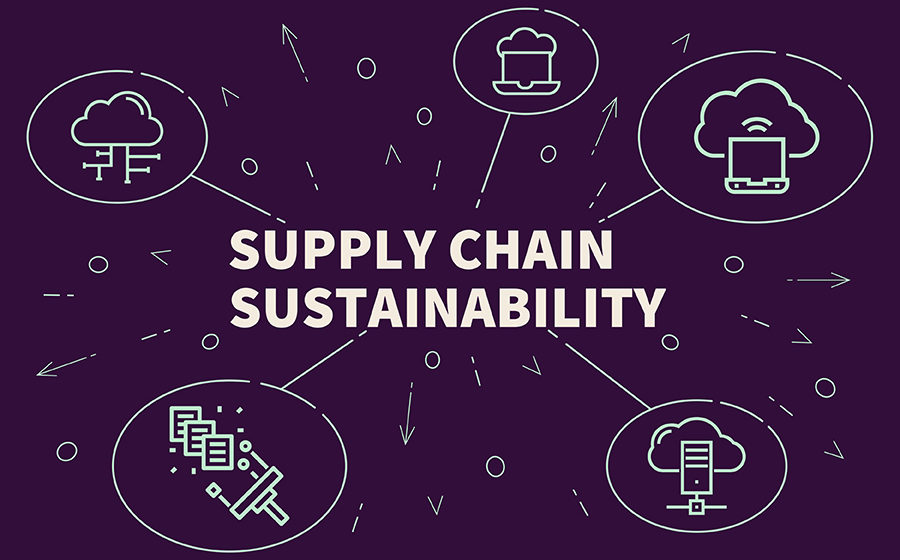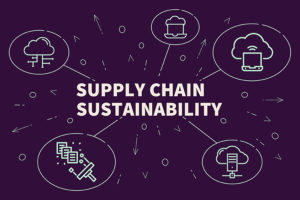
Sustainable Procurement: Addressing Hidden CSR Risks
February 6, 2020
The private sector is making great promises around supply chain sustainability. But hidden corporate social responsibility (CSR) risks may be one reason progress on sustainable procurement remains slow. For OEM supply chain managers, what are some of those challenges that you may or may not be feeling yet, and how can you address them?

Sustainability Stagnation
Despite “many headline-grabbing public promises…companies remain mostly stagnant around supply chain sustainability,” says EcoVadis co-CEO Pierre-Francois Thaler. Thaler based his observations on his company’s 2019 Global CSR Performance Index.
Globally, sustainability performance has remained consistent. Some 50.7% of the more than 30,000 companies indexed worldwide received scores of 45 or higher in 2018, compared to 49.2% in 2017 and 50.5% the year prior. Companies with a score of 45 or more are considered engaged. A score of 65 is required to be recognized as advanced or outstanding.
Nevertheless, sustainable procurement was the lowest-scoring among the Index’s 21 CSR themes. The analysis of supply chain sustainability performance across 2016 through 2018 highlighted an “urgent need for organizations to more proactively engage with supply partners to uncover and address hidden CSR risks.”
Procurement executives are in a position to effect change. “With most global enterprises spending 50-70% of revenue in the supply chain, it’s the most natural and effective foundation for driving the structural change,” Thaler said.
As the United Nations Development Programme (UNDP) states, production and consumption can “help countries end poverty and significantly reduce inequalities and exclusion – in parallel with measures to combat climate change.”
But in the face of hidden sustainable procurement challenges, how can a company drive change?
Addressing Hidden CSR Risks
Identifying risks and areas of improvement needs to be a priority, said Thaler. “There needs to be a conscious effort to improve supply chain visibility, transparency and collaboration.”
In the 2019 Sustainable Procurement Barometer, which EcoVadis conducted with NYU’s Stern Center for Sustainable Business, the commitment to sustainable procurement increased significantly in the last three years (81%). Yet the report observed, “most companies today are still managing programs from a compliance standpoint, a trap that leads to limited engagement and lacks incentives to drive performance and long-term improvements.” While the Barometer found executive-level support increasing for CSR, it also discovered that the emphasis on labor and human rights, ethics, and environmental concerns is growing.
Yet issues remain. For one, companies are more aware of potential labor issues, but measures to address discrimination, harassment, or lack of diversity are still lacking. The CSR Index found “32% of companies globally implement at least one measure – such as effective whistleblowing procedures, awareness training and anti-discrimination recruitment tactics.” Yet “68% still have no measures in place to promote equality and inclusive working environments.”
Overall, large organizations scored higher on labor and human rights than their small or medium-sized counterparts (46.7 vs 44.4).
Still, the area of labor and human rights is fraught. The supply chain could bring corporate exposure to illegal workers, country-specific human rights abuses, or employees working in unsafe conditions. Industries facing a labor shortage could be at greater risk.
On the business ethics front, there is far greater pressure on companies today to be transparent, partner with responsible vendors and suppliers, and not put the bottom line above consideration of community impact.
Yet “the annual costs of international corruption amount to a staggering $3.6 trillion,” according to the UN. Secretary-General Antonio Guterres stated this “global scourge…robs societies of schools, hospitals and other vital services, drives away foreign investment and strips nations of their natural resources.”
Speaking of natural resources, environmental concerns are another main area of concern. Companies must be conscientious of their use of hazardous raw materials, contributions to global climate change, and investments in fossil fuel-centered energy sources.
Driving Sustainable Procurement
So, how does a company tackle all these CSR risks? With good governance, “the appropriate internal controls (accountability mechanisms, systems and procedures) are used to mitigate, and in some cases, turn risk into opportunities,” writes Dr. Paul Toyne, co-director of CSR consultancy Article 13.
The UNDP offers several suggestions as well:
- Incorporate sustainability criteria into purchasing evaluations
- Develop monitoring mechanisms and assessments to promote vendor compliance
- Stimulate innovation through crowd-sourcing and piloting technology
- Integrate procurement at the project design stage
Relationship-building matters too. Involving employees in the way things are done and open communication with customers, suppliers, investors and the community can help identify risks sooner. Toyne suggested feedback questionnaires to all stakeholders to help with accountability.
When it comes to supplier relationships, Shaun McCarthy, director at Action Sustainability, offers a solid distinction. The focus should be “on sustainable supply, not sustainable supplier.” Raising awareness also makes a difference. Providing training and internal support for employees encountering risks can drive better decision making, Toyne argued.
This also helps with the embodiment of business’ CSR values. CSR needs to be incorporated throughout business – not just as a way to boost brand reputation. Without real buy-in, the CSR promises could backfire. “Consumers are definitely able to see straight through greenwashing marketing,” argued ERA Environmental.
Consumers are using their dollars to demand action, Padmini Ranganathan, global VP, risk and sustainability at SAP Ariba, told Supply Management. Thus in 2020, buyers and suppliers need to come “together to create value for their mutual customer, and where else can this happen but from the beginning of the procurement process when sellers come calling with their business card or buyers scan the globe for the best suppliers?”

Managing Risk and CSR Business Success
Working to mitigate these hidden CSR risks can reward the companies that make the effort. In the Barometer findings, sustainable procurement meant respondents benefited from:
- Mitigated risk (58%)
- Cost reductions (30%)
- Innovation and expansion of new markets (25%)
- Improved procurement metrics (24%)
Sustainable procurement can lead to more innovative approaches driving competitive advantage and business value. The private sector needs to do more than promise to do better. Procurement officers, together with supply chain partner-suppliers, who prioritize transparency beyond regulatory accountability can address hidden CSR risks to truly progress and drive positive impact.
